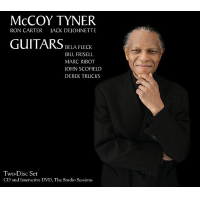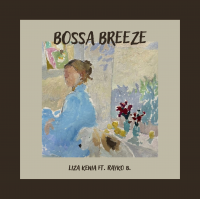Home » Jazz Articles » Interview » Adrian Belew: Power Trios and Crimson Heads
Adrian Belew: Power Trios and Crimson Heads
AB: Well, musically as I mentioned earlier, they are brothers. They are cut from the same cloth. It just kind of made sense to keep a theme going. It's not my idea, probably Robert's. But I totally agree with it, I like that. I like that idea of continuity. I've always thought with King Crimson over the whole period I've been in it and before, that was one of the things about it. It has its own brand. You don't say, "Well, what's King Crimson music?" It's not jazz, it's not prog rock, it's not rock n' roll, it's King Crimson music. It's got its own name because it's got its own elements. And you use those same elements over and over for 20 years, 30 years, 40 years. class="f-right">Return to Index...
Back to Bowie
AAJ: You did the Sound and Vision tour with David Bowie in 1990. You were the musical director as well. How did that come about? It had been a while since you played with David Bowie.
AB: It had been from 1979 to 1990. It was a long time. I didn't think we'd ever do anything together again. There was no reason not to, but it just didn't seem like it would happen. He went on and did many other things, and so did I. I think it was because I had video out at the time called, "Oh Daddy," and the video was kind of cute and fun. I think it reminded David of how much he liked me. "Oh, there's Adrian. I love Adrian. I would be great to play with him again." I really think that is all it was. David was reminded of me again. He saw me still out there and doing well. "[I] Wonder if he could be the musical director and guitarist?" So I was.
He called me up while I was on tour for the Mr. Music Head (Atlantic, 1989) album I had just made. He said, "Let's get together and talk about this. I want to do a world tour. I want to do all my best hits, and then I'm never going to do them again."
AAJ: He lied.
AB: [Laughs]
 
AAJ: I'm not sure if he ever played, "Space Oddity" again. Not really sure.
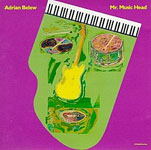 AB: The challenge was amazing. To play all that variety of music from so many different records and so many different lineups with one band. And you know, a lot of that music had everything from sax sections to strings, orchestras...everything is on that music. David really likes to vary his coloration from record to record. So it was a big challenge for me. What I basically did as musical director was to orchestrate that. Teach the band. Find an arrangement that works for the band and work that out with them. And then it was down to being the guitarist, and how do you cover all those bases. I think we did pretty well with it. There are a couple parts where you falter. I mean, how do you do "Young Americans" without a saxophone? [Laughs] I tried, at least.
AB: The challenge was amazing. To play all that variety of music from so many different records and so many different lineups with one band. And you know, a lot of that music had everything from sax sections to strings, orchestras...everything is on that music. David really likes to vary his coloration from record to record. So it was a big challenge for me. What I basically did as musical director was to orchestrate that. Teach the band. Find an arrangement that works for the band and work that out with them. And then it was down to being the guitarist, and how do you cover all those bases. I think we did pretty well with it. There are a couple parts where you falter. I mean, how do you do "Young Americans" without a saxophone? [Laughs] I tried, at least. AAJ: I was really disappointed that he never put out an official live album or DVD from that tour. I've seen some bootlegs from that tour thanks to YouTube and such, and it was really monstrous.
AB: It was very good. I loved that tour. I had a great time, and I got to know David really well. It was first class all the way. It's the kind of thing you dream of doing once in your life. It was a very special time.
AAJ: You met Paul McCartney on that tour.
AB: I met Paul McCartney. I met my wife! We met after a show in Orlando in the lobby of the Peabody hotel. So that was, for me, a life changing tour. It changed everything. I'm with you though, I'd like to have a record of that. class="f-right">Return to Index...
Back to Crimson
AAJ: The, '90s King Crimson, how did that come together? After Robert ending the band 10 years previous in Musician magazine?
AB: Well, I kept hearing rumors that King Crimson was starting again. I had not had a call, and I thought, "Well that's interesting. Is it going to be a totally new lineup?" I thought about a little bit, and I thought, "I've invested a lot of time and energy into King Crimson. I really feel that I am a part of it. And, if there is a new King Crimson, I don't want to be standing on the sidelines watching the parade go by. I want to be in the parade." [Laughs]
So it just so happened that I was going to Europe to do some dates. I had enough time to stop in and visit Robert in England. Ostensibly, I was just there to see him as a friend and say "Hi." While I was there, we did a new version of, "Cadence and Cascade." He asked me, "Would you be able to sing this, since you're here?" And "Of course, I'll sing it, I know the song very well." And I did that, then I got around to the subject of King Crimson. I said, "Well if there is a new King Crimson, I want you to know that I'd like to be a part of it. And, if that's not in your plan, that's fine, but wanted you to know that I am agreeable to that." And after that, Robert said that got his wheels in motion, and he really got serious about it. I don't know, he had new material, he had new energy for it.
The next that happened, he came to my house in the United States, and we began writing new material again. Like nothing had changed. I mean after he left he had about 30 seconds of chords changes for what would eventually become "One Time." And we had already started working on other pieces like "VROOOM" and things like that. I had a very clear idea for what he was shooting for musically speaking. It was, in some ways, akin to an advanced Beatles. That was a little bit of what I was hearing. I wanted to hear something like "I Am The Walrus" which turned into a song like "Dinosaur." That's the King Crimson version of that type of music.
AAJ: Was that song lyrically about impressions in the press that King Crimson was one of these old progressive bands going back on tour—the band as dinosaur?
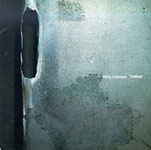 AB: No, it wasn't really at all. Actually, it was more of a personal statement. I was tired of people always digging into my life and trying to find out things, you know. I don't know what it was about. Maybe I felt at that point that I was a dinosaur. The music industry was moving so fast and past me, and I knew that I wasn't going to create hit records, and I wasn't going to be on the radio, so I had to change the focus of my career around at that time.
AB: No, it wasn't really at all. Actually, it was more of a personal statement. I was tired of people always digging into my life and trying to find out things, you know. I don't know what it was about. Maybe I felt at that point that I was a dinosaur. The music industry was moving so fast and past me, and I knew that I wasn't going to create hit records, and I wasn't going to be on the radio, so I had to change the focus of my career around at that time. AAJ: So it was sort of a comment on where you were at, at that time.
AB: Yeah, and I never really considered the idea that King Crimson was called a dinosaur by a critic or anything like that. Never even occurred to me. I was also in a big dinosaur phase. I read volumes of books about all the new dinosaur theories. If you remember, that was around the time just before Jurassic Park (1993) came out. I was already studying all the new theories that they had. Especially the one that really struck me was the one that said dinosaur were early versions of birds. And I'm a bird watcher. So for me, that was incredible. It got me going. I started reading everything I could about what was going on there. For a long time, dinosaurs were just these big plodding things, no one knew anything about them or where they came from. All of a sudden, there was this explosion of information.
AAJ: Yeah, I could definitely hear that Beatles influence on THRAK (DGM Live, 1995) and VROOOM (DGM Live, 1994). Especially on the outro of "People." I thought at the time, "Wow, this sounds like something straight off of Abbey Road (Apple, 1969)."
AB: You know, for me, I always thought that King Crimson had that. Even from the very first record [In The Court of the Crimson King (DGM Live, 1969)]. If you listen there is an interesting combination going on that I've always felt was essential to the band. You had the radical instrumental music, dressed as songs, or not, such as, "21st Century Schizoid Man," followed by a very well-written song—the classical, classic rock song, "I Talk To The Wind." Could it have been a Lennon/McCartney tune? Of course. So, they always have that equation. I always felt that was important to King Crimson. Over the years, I've heard people say, "Well, wouldn't it be nice if King Crimson just improvised? Or if they just played the individual pieces of music?" You know what? It wouldn't. You wouldn't have that balance. Without those elements, you would be missing something. class="f-right">Return to Index...
Painting and Improvisation
AAJ: Before we end here, I wanted to cover two more topics—your paintings and your views on improvisation.
AB: Well, before you leave, I will have to show you some of my paintings. [Points back at his basement studio] This is also my personal art gallery down here, in the living quarters part of the studio. I always thought I would try my hand at painting. I don't know why. I've always noodled around and scribbled and drawn things all my life. But I had no training, I had no reason to believe that I could ever paint. I figured, "Well, when I am 75, I will take up painting." [Laughs] By then, I will be too old to do anything else. It just happened prematurely. You know, there is an event that occurred that caused me to want to paint. That's my first painting right behind you.
AAJ: The first one. Wasn't that one of your album covers?
AB: Yes it is, yeah. In the back of my mind, I was thinking, "Well, if I can paint something that I like well enough, maybe I can use it as an album cover." I really didn't know that I could paint. I went down to an art store. I got a few canvases; I did a lot of questioning. I found about acrylics and all the mediums you can mix in it to make it different textures and liquidities, glossies, watercolor-like. I loved all that alchemy that you could do, so I chose acrylics.
I chose a canvas size, 30x40, that you could reduce down and be a nice artwork for CDs. I had that in the back of the mind. I thought I'd just try this, and maybe I'll accidentally find something that's cool looking. And I got so immersed in it, I did 60 paintings in about a year. I would just paint forever, all day and all night. I just couldn't stop myself. And every painting I made was entirely different. It was strange. I had no idea what I was doing. Just like teaching myself to play music. So I just figured it out. I just combined this thing and that. Now I'm going use a paint brush, now a knife, now spray paint, and I just kept trying these things.
My excursions were always based on abstract painting, so I never know thought, "Okay, I'm trying to make it look like something." I'm not going to do a portrait of someone or a landscape or a basket of fruit, I'm just trying to do something interesting with colors and shapes and geometrics and dimensions. If you really think about it, that's exactly what you do with music. It relates so well. In music, you're creating dimensional things, you're making depth, you're changing colors like you change sounds. You're using harmonies and contrasts. You're using all the same techniques that I was using with sound, I was now using with paints and a canvas. It really was an explosion of fun for me.
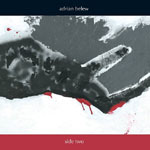 And I'm still loving it. I still don't know what I'm doing. I still don't know how I do what I do or how to repeat it so that's why mostly all of my paintings are one of a kind.
And I'm still loving it. I still don't know what I'm doing. I still don't know how I do what I do or how to repeat it so that's why mostly all of my paintings are one of a kind. AAJ: Doesn't Robert have some of your paintings over in the Discipline Global Mobile office?
AB: Robert has actually been here many of the times that I've been painting, so he'll get up in the morning and come in the studio. There's a new painting on the floor drying. [Robert says], "Oh, I love that one!" He's really one of the biggest fans of my paintings, I have to say, "Thank you, Robert." I gave him several paintings. And, he eventually asked to buy some paintings so I sold him eight of them, which now adorn his residence and his working place in England. So that's nice that someone of his taste would appreciate what I do. And he knows exactly what I told you, that I'm doing it just for fun, that it's just another way of expressing myself. I'm not trying to be a painter or an artist. It's just something that I found that I can do, and I love doing it.
AAJ: Have you done any shows?
AB: I have not done any shows, and I haven't tried to do anything serious with the paintings beyond using them as record covers. I've given a few away. I've sold a few to Robert. I have not tried to sell paintings. I'd not really be interested in doing that. I read a thing that Paul McCartney said about his paintings. He said, "Well, they are like my children. I don't need to sell them." So I don't want to sell them, and I don't need to. I would make prints and posters of them, but mainly right now, it's just a means of expression to me. Purely that. It's pure expression. You lose yourself in it, and three hours later you say to yourself, "Man, how did I do that?" Or...three days later.
AAJ: That sounds a lot like writing a song.
AB: It's exactly the same process to me. It's using the creativity, the musical creativity to do something else. I love it. I plan to do it forever.
AAJ: King Crimson shows since the '70s, and possibly before that, have all incorporated improvisation. All the incarnations of Crimson you've been a part of have made that a part of the show. In the 1990s, you even released an entire album [Thrakattak (DGM Live, 1996)] of improvisations by King Crimson recorded live in various venues on the 1995-1996 tour. So much of jazz and other music is based almost entirely on improv. To many listeners, improvisation is a great mystery. How would you comment on that mystery?
AB: I would say it's mysterious to me too. Honestly, I've created a lot of music in the studio by creating a piece of music on the spot and then turning it into something. I've played live where there are sections where you are free to do whatever you want, and we would improvise together. I'm doing a lot of it with my trio now. I can really lock horns with them. My mindset with Eric and Julie is really wonderful because they're siblings, they grew up together. They can just look at each other and know where they are going to go. They'll just take off, and it leaves me free to just ride and fly over the top of that.
So, I'm doing more improvising with my trio than I ever have. And, to some degree, improvising {for me} is soloing over the music. You're taking some theme, some idea, and you're expounding on it, but you're letting yourself do it completely freely. There's another aspect to it, which is when the entire ensemble is improvising, which is what I am mostly trying to approach with this trio. Where everyone on stage at once is trying to go somewhere together that you've never attempted to go, you've never planned it. You don't know how it's going to begin or end. You don't know where it's going in the middle. Obviously you have to have a certain level of musicianship to have control over your sounds and your instrument and the mechanics of what you're doing, to free yourself to that point. What happens then, I don't know.
Improv is exactly like what happens when I paint. I get lost in it, and before I know it, we're doing some incredible thing. I don't know how it happens. Later you listen back to it, as I try to record our shows live, and you go, "How on earth did we do that?" It sounds like we knew what we were doing. I think it's intuitive mostly, and it really shows the range of what you've learned and experienced together or apart. It really shows how much time you've put into your instrument, and maybe how much time you've spent together as a group. If you haven't really, really worked hard at the mechanics of your instrument, you'll fumble around, and you'll sound like a bad blues player or something.
You have to go way beyond that. I think the main key in improvising is you have to allow yourself to do it. You have to open up and say, "Okay, I don't mind. I'm just going to go there. I'm going to trust the process and just let it happen." Because we are so trained as musicians to go perform. King Crimson music or my music is very precise. You have to know what you're doing. The arrangements are the same, so you're going to play it correctly every night. Same with Frank Zappa's music. It may sound like a bunch of noise, but everyone was trained to know exactly what they were doing. So when you're so trained to have that as mostly what you do in concert, it's so hard to go totally the opposite way and say, "Now we're just going to make something up on the spot. If it fails or falls on its face, so be it." I think that mostly these days, I'm working with musicians who don't fall on their faces ever.

AAJ: That brings to mind the jam band phenomenon of the last 10 or 20 years—Phish and the like. I know you worked with Umphrey's McGee and String Cheese Incident. These bands have taken some of the improvisations and rhythms of jazz and applied it to rock in a new way.
AB: Yeah, Umphrey's McGee is a great band. It's truly amazing. A whole new form of music has come out of that. I think it was totally unexpected by anyone. All of a sudden bands can go out and play whatever they want for 40 minutes at a time, and people will stand there and be excited about it. I think it's wonderful that the ears of the public are now open to that.
I think it all works on the basis of education. People have been educated now to different types of music and what you can do with music. I think people get tired of hearing what they're "supposed" to like. And it's great to hear a good musician get on stage and just blow it out. And there's a special thing that happens when you're a part of that, whether you're on the stage or in the audience. Something unique is occurring and you know it. You feel the energy of it. You can almost feel the musicians straining and looking at each other kind of saying, "Where are we going?" I think that's kind of exciting, and I'm glad that there's a jam band kind of world out there now.
AAJ: I think you've been accepted fairly well into that world.
AB: Well, I'd like to do some of it. They never call me to do the festivals. I've never done Bonnaroo or any of those big festivals. But I'm hoping that eventually they will realize that the trio element is perfect for their series of festivals they do every year. We go out, and we don't do anything the same. I mean, we have a set list, but I've made in the arrangements places in my songs that were once three-to-four minutes—I've made points where, okay this opens up now and anything goes.
AAJ: Like, "Beat Box Guitar." [on Side Four]
AB: Yeah, that was perfectly written for that. It's very jazz-like in that sense. There is a theme, and once you've played the theme, you are going to go somewhere else from it. Maybe taking some of those elements from it and incorporate it into what you're playing. Maybe coming back to it to sort of reference so people know maybe 10 minutes in, "Yeah, he's still playing that song." But that's very jazz-like; you've got the head, the improvisation, then you come back to the head.
 
AAJ: Speaking of themes, I notice you keep returning to the rhino in your music. It comes up on multiples albums and songs. I know you are an animal lover, and you obviously have affection for this animal.
AB: And elephants, and birds, and whales, and all kinds of animals. One thing I learned from working with Frank Zappa is motif. Frank would have motifs in his songs. He was always talking about dwarves and midgets. And, these little things that keep reappearing. Frank told me that is the way you tie your whole body of work together—by having some kind of motif. Early on, I really like making the guitar sound like odd things. And some of those things sound like animals.
It's easy to get your guitar to sound like some big old grunt or growl. So I thought, maybe I'll just stay with that theme. I started writing songs with that theme. I developed a sound that it seems like a rhinoceros would make so I wrote a song, "The Lone Rhino." I develop a sound that sounded like an elephant trumpeting, so I wrote, "Elephant Talk." That way it's not just some kind of effect. It makes a musicality of it. You can see that there's a reason why I am making this sound with the guitar, it fits the song.
Selected Discography
Nine Inch Nails, Ghosts I-IV (Null, 2008)
Adrian Belew, Side Four (Independent, 2007)
The Bears, Eureka (Bears Music, 2007)
Adrian Belew, Side Three (Sanctuary, 2006)
Adrian Belew, Side Two (Sanctuary, 2005)
Adrian Belew, Side One (Sanctuary, 2005)
King Crimson, Power To Believe (Sanctuary, 2003)
The Bears, Live (Bears Music, 2001)
The Bears, Car Caught Fire (Bears Music, 2001)
King Crimson, ConstruKction of Light (Discipline Global Mobile, 2000)
Adrian Belew, Coming Attractions (Thirsty Ear, 2000)
King Crimson, Absent Lovers (Discipline Global Mobile, 1998)
Adrian Belew, Salad Days (Thirsty Ear, 1998)
Adrian Belew, Belew Prints : The Acoustic Adrian Belew Volume 2 (Adrian Belew Presents, 1998)
Adrian Belew, Op Zop Too Wah (Passenger, 1997)
Adrian Belew, The Acoustic Adrian Belew (Discipline Global Mobile, 1995)
King Crimson, THRAK (Discipline Global Mobile, 1995)
The Bears, The Bears (Primitive Man, 1987)
King Crimson, Three of a Perfect Pair (Warner Brothers, 1984)
Adrian Belew, Lone Rhino (Island, 1982)
King Crimson, Beat (EG, 1982)
King Crimson, Discipline (EG, 1981)
David Byrne, Catherine Wheel (Sire, 1981)
Talking Heads, Remain In Light (Sire, 1980)
Frank Zappa, Sheik Yerbouti (Ryko, 1979)
David Bowie, Lodger (Virgin, 1979)
Photo Credits
Power Trio Photo: Courtesy of Adrian Belew
Photo of Adrian Belew's guitar collection: Justin M. Smith
All Other Photos: Daryl Darko
Tags
PREVIOUS / NEXT
Support All About Jazz
 All About Jazz has been a pillar of jazz since 1995, championing it as an art form and, more importantly, supporting the musicians who make it. Our enduring commitment has made "AAJ" one of the most culturally important websites of its kind, read by hundreds of thousands of fans, musicians and industry figures every month.
All About Jazz has been a pillar of jazz since 1995, championing it as an art form and, more importantly, supporting the musicians who make it. Our enduring commitment has made "AAJ" one of the most culturally important websites of its kind, read by hundreds of thousands of fans, musicians and industry figures every month.



